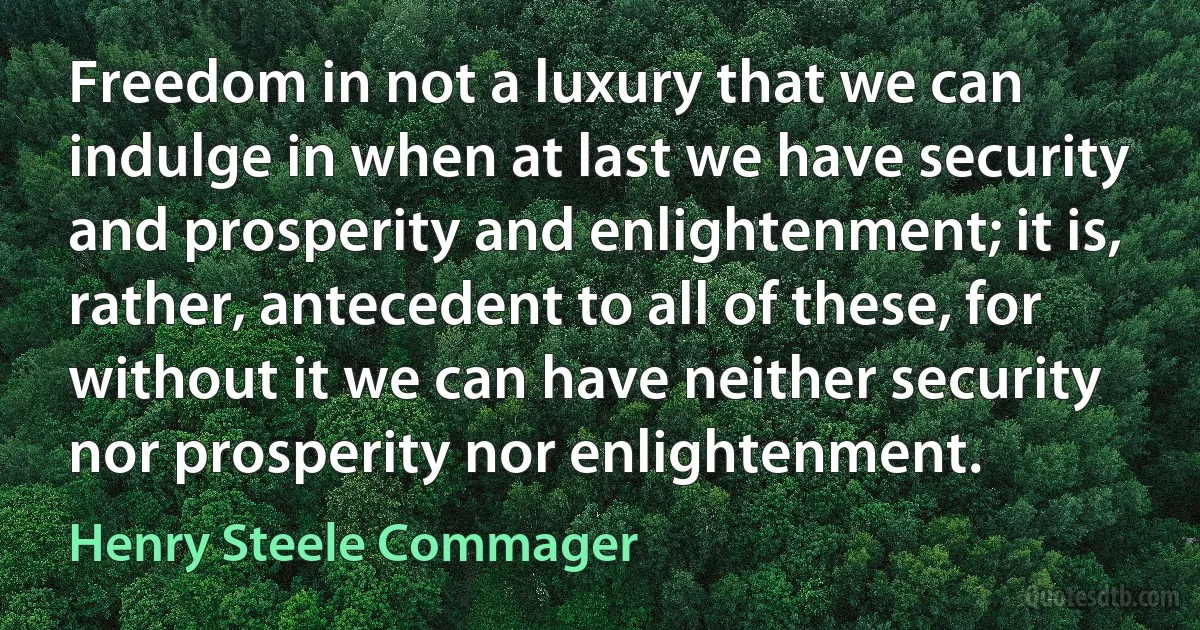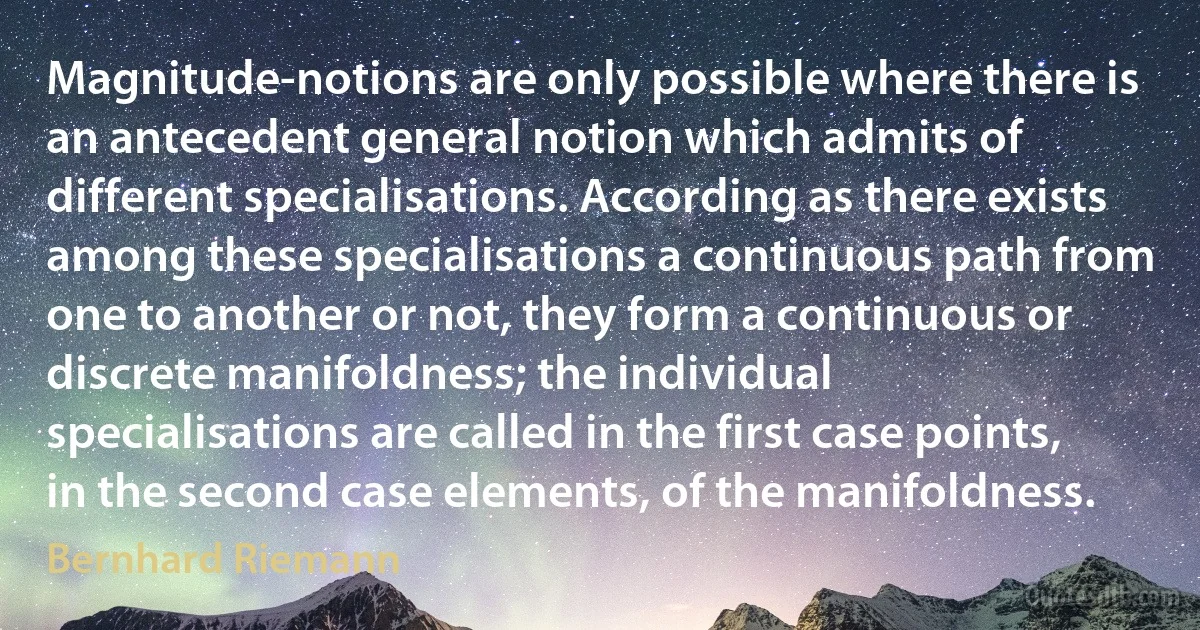Antecedent Quotes
I, for one, have been singled out for particularly bilious and venomous assaults. These criticisms, as near as I can tell, and I admit that it is rare that I take notice of this calumny, have little to do with any particular opinion, though each opinion does provide one more occasion to criticize. Rather, the principal problem seems to be a deeper antecedent offense: I have no right to think the way I do because I'm black.

Clarence Thomas
A constitution is the property of a nation, and not of those who exercise the government. All the constitutions of America are declared to be established on the authority of the people. In France, the word nation is used istead of the people; but in both cases, a constitution is a thing antecedent to the government, and always distinct therefrom.

Thomas Paine
At the point at which the concept of différance, and the chain attached to it, intervenes, all the conceptual oppositions of metaphysics (signifier/signified; sensible/intelligible; writing/speech; passivity/activity; etc.)- to the extent that they ultimately refer to the presence of something present (for example, in the form of the identity of the subject who is present for all his operations, present beneath every accident or event, self-present in its "living speech," in its enunciations, in the present objects and acts of its language, etc.)- become non pertinent. They all amount, at one moment or another, to a subordination of the movement of différance in favor of the presence of a value or a meaning supposedly antecedent to différance, more original than it, exceeding and governing it in the last analysis. This is still the presence of what we called above the "transcendental signified.

Jacques Derrida
They rode on. They rode like men invested with a purpose whose origins were antecedent to them, like blood legatees of an order both imperative and remote. For although each man among them was discrete unto himself, conjoined they made a thing that had not been before and in that communal soul were wastes hardly reckonable more than those whited regions on old maps where monsters do live and where there is nothing other of the known world save conjectural winds.

Cormac McCarthy
When a man acts in ways that annoy us we wish to think him wicked, and we refuse to face the fact that his annoying behaviour is a result of antecedent causes which, if you follow them long enough, will take you beyond the moment of his birth and therefore to events for which he cannot be held responsible by any stretch of imagination.

Bertrand Russell
With respect to the homosocial/homosexual style, it seems to be possible to divide Victorian men among three rough categories according to class. The first includes aristocratic men and small groups of their friends and dependents, including bohemians and prostitutes; for these people, by 1865, a distinct homosexual role and culture seem already to have been in existence in England... It seems to have constituted a genuine subculture, facilitated in the face of an ideologically hostile dominant culture by money, privilege, internationalism, and for the most part, the ability to command secrecy... This role is closely related to - is in fact, through Oscar Wilde, the antecedent of - the particular stereotype that at least until recently has characterized American middle-class gay homosexuality; its strongest associations, as we have noted, are with effeminacy, transvestism, promiscuity, prostitution, continental European culture, and the arts.

Eve Kosofsky Sedgwick
It was my fortune, or misfortune, to be called to the office of Chief Executive without any previous political training. From the age of 17 I had never even witnessed the excitement attending a Presidential campaign but twice antecedent to my own candidacy, and at but one of them was I eligible as a voter.
Under such circumstances it is but reasonable to suppose that errors of judgment must have occurred. Even had they not, differences of opinion between the Executive, bound by an oath to the strict performance of his duties, and writers and debaters must have arisen. It is not necessarily evidence of blunder on the part of the Executive because there are these differences of views. Mistakes have been made, as all can see and I admit...

Ulysses S. Grant
A work upon the plan originally contemplated by the Author seems still to be required, to initiate the young and uninstructed in the study of those MEDALS 0F CREATION-those electrotypes of nature-the mineralized remains of the plants and animals which successively flourished in the earlier ages of our planet, in periods incalculably remote, and long antecedent to all human history and tradition. With this conviction the present volumes are offered... as a guide for the Student and the Amateur Collector of fossil remains; for the intelligent Observer who may desire to possess a general knowledge of the subject, without intending to pursue Geology as a science; and for the Tourist who may wish, in the course of his travels, to employ profitably a leisure hour in quest of those interesting memorials of the ancient physical revolutions of our globe, which he will find everywhere presented to his observation.

Gideon Mantell
The word grace evidently implies that there is no antecedent merit. And in this way the apostle to the Romans appears to argue, when he says, 'And if by grace, then is it no more of works: otherwise grace is no more grace. Now to him that worketh is the reward not reckoned of grace, but of debt.' All this is perfectly intelligible, even in the conduct of liberal and magnificent human characters. They frequently bestow their gifts from a pure spirit of liberality, without the smallest previous claim on the score of merit. And shall not God, whose perfections are infinite, do more than this?

Thomas Bradwardine
Certain it is, that any supposed obstructions, concerning the quality or temperature of any or every one of those worlds, could not have been any bar in the way of God Almighty, with regard to his replenishing his universal creation with moral agents. The unlimited perfection of God could perfectly well adapt every part of his creation to the design of whatever rank or species of constituted beings, his Godlike wisdom and goodness saw fit to impart existence to; so that as there is no deficiency of absolute perfection in God, it is rationally demonstrative that the immense creation is replenished with rational agents, and that it has been eternally so, and that the display of divine goodness must have been as perfect and complete, in the antecedent, as it is possible to be in the subsequent eternity.

Ethan Allen
Especially do the evils of the times, the folly and blindness of the masses, the injustice of rulers, the perversion of religion in unfruitful ceremonialism work upon the souls more finely attuned as a stimulus and spur; the feeling of the evil stirs their moral judgment or conscience to the criticism of the existing situation, and out of the criticism there grows for them the new ideal which impresses itself upon them as the truth that has the power to save from the corruption of the time; and while they first raise themselves to this ideal, they also win power and courage to draw others toward it. Thus they become the proclaimers of a higher truth which, over against the antecedent error, appears as something wholly new, as a revelation from above, but which is, indeed, nothing else than a higher development of the impulse toward truth and righteousness that is a natural quality of the human mind.

Otto Pfleiderer
The premisses of demonstrative knowledge must be true, primary, immediate, more knowable than and prior to the conclusion, which is further related to them as effect to cause... The premisses must be the cause of the conclusion, more knowable than it, and prior to it; its causes, since we posses scientific knowledge of a thing only when we know its cause; prior, in order to be causes; antecedently known, this antecedent knowledge being not our mere understanding of the meaning, but knowledge of the fact as well. Now 'prior' and 'more knowable' are ambiguous terms, for there is a difference between what is prior and more knowable in the order of being and what is prior and knowable to man. I mean that objects nearer to sense are prior and more knowable to man; objects without qualification prior and more knowable are those further from sense. Now the most universal causes are furthest from sense and particular causes are nearest to sense, and they are thus exactly opposed to each other.

Aristotle
when we gaze in unbounded admiration on that ineffable mercy of His, which with unwearied patience endures countless sins which are every moment being committed under His very eyes, or the call with which from no antecedent merits of ours, but by the free grace of His pity He receives us.

John Cassian
Analysis... takes that which is sought as if it were admitted and passes from it through its successive consequences to something which is admitted as the result of synthesis: for in analysis we assume that which is sought as if it were (already) done (ɣϵɣονός) and we inquire what it is from which this results, and again what is the antecedent cause of the latter, and so on, until by so retracing our steps we come upon something already known or belonging to the class of first principles, and such a method we call analysis as being solution backwards.

Pappus of Alexandria
Where the self is conceived as prior to its ends, independent of the roles it may occupy at any given time, reputation cannot be a matter of honor in the traditional sense. For the unencumbered self, not honor but dignity is the basis of respect―the dignity that consists in the capacity of persons as autonomous agents to choose their ends for themselves. Unlike honor, which ties respect for persons to the roles they inhabit, dignity resides in a self antecedent to social institutions, and so is invulnerable to injury by insult alone. For selves such as these, reputation matters, not intrinsically, as a matter of honor, but only instrumentally, as a business asset for example.

Michael J. Sandel
Since each state in becoming a member of a federal republic retains an uncontrolled jurisdiction over all cases of municipal law, every grant of jurisdiction to the confederacy, in any such case, is to be considered as special, inasmuch as it derogates from the antecedent rights and jurisdiction of the state making the concession, and therefore ought to be construed strictly, upon the grounds already mentioned.

St. George Tucker



